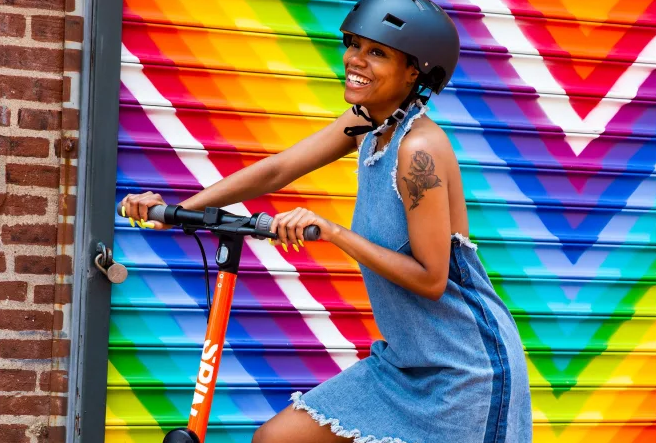They're scootering away from stress.
Most people who use shared e-scooters report higher levels of emotional well-being after a ride, adding to a mountain of evidence that sustainable transportation may be an overlooked tool in fighting America's mental health crisis.
In the first-ever study of the holistic health impacts of e-scooters, researchers from micromobility outfit Spin found that 69 percent of the company's riders either "agreed" or "strongly agreed" with the statement "riding a shared scooter improves my mental health" — with a majority of riders further specifying that the mode made them feel more relaxed, less stressed, and more mindful of their surroundings and fellow road users.
And a whopping 87 percent of riders said that knowledge of the environmental impact of their transportation choice was a major component of why they felt so good about taking a spin on a Spin — a fascinating finding that underscores that the benefits of shifting journeys out of cars aren't just environmental.
The mental health outcomes of other active modes, of course, have been well-documented — especially when compared to driving, which study after study has shown increases a commuter's risk of depression, anxiety, and overall low "life satisfaction." But the report authors say most of that research has focused on how the exercise inherent to biking and walking can improve a person's mood, rather than the other benefits of transportation options that let commuters experience their streets at human scale — whether or not they're getting sweaty while doing it.
"Electric micromobility has seen most of its growth in the last few years, so the benefits haven't been extensively studied," said Kyle Rowe, Spin's global head of government partnerships. "But users really feel like they have super-human powers when they’re on an e-scooter. That's pretty absent from the media covering [the mode], and it's certainly absent in how we implement policies to support scooters in our cities."
Mental health as a key transportation metric
Rowe isn't the only expert who's noticed that the mental health consequences of car dominance — not to mention the emotional benefits of others modes — are often overlooked by city officials.
Nationally recognized transportation leader Warren Logan, who contributed to the report, also questioned the wisdom of over-focusing on measurements of transport success like level of service for drivers, while ignoring meaningful data on which modes make commuters feel happy and connected to their neighborhoods.
"Foolishly, we continue to measure [micromobility's] effectiveness based on car-dominated metrics," said the former policy director for the city of Oakland. "Shared scooters really broke that paradigm. Sure, they’re quick and they’ll definitely get you through a traffic bind with ease. But, most importantly — they’re hella fun! That’s what we should be measuring: the exhilaration, the joy, the adventure that these things give us.”
Rowe acknowledges that the report doesn't offer a comprehensive blueprint for how cities might collect those sorts of critical metrics, and its findings only give a glimpse into what the true mental-health-boosting power of micromobility might be. The company didn't isolate how people of different races, income levels, genders, or other demographics felt on scooters, and the survey respondents, while probably representative of scooter riders overall, were predominantly young and male.
The report also doesn't delve into how the context in which people ride might shape the way they feel on micromobile modes — an insight that Rowe says could be particularly valuable for city leaders looking to maximize commuters' happiness through strategic infrastructure investments. For instance, an impressive 70 percent of respondents said that scootering reduced their stress levels, but he wonders whether the 30 percent who said it didn't were simply worried about the possibility of a crash with a driver — and what that might say about the state of their streets.
"We could probably find correlations between [respondents who said scooters reduced their stress and respondents who lived in] neighborhoods with better bike and scooter facilities," Rowe said. "Those folks are probably more comfortable riding — whereas if you’re on a four-lane road with a 35 mile per hour speed limit and unprotected right hand turns in front of you, you’d probably say, 'no way — that was really stressful.'"
'More than a transportation utility'
Even on that hypothetical arterial, though, scooters may still be making people smile — particularly when they're riding with others. In one of the study's more surprising findings, 63 percent of respondents said that e-scooters allowed them to "make personal connections and socialize with friends and family," challenging the myth that solo modes are isolating, even when they don't enclose their rider in a car-shaped cage.
The unexpected ability of micromobility to bring people together may have been particularly important during the pandemic, when scootering surged as transit ridership nosedived across the country. Rowe says the mode served as a space for safe, open-air social connection during that time — while also connecting people with the destinations they need most.
"The pandemic obviously put stress on a lot of [erstwhile transit] commuters to find individual, outdoor modes of transportation, but that wasn't his mode's only benefit during that challenging time," he added. "Scooters had a positive impact on our mental health and well-being at a time when a lot of people were rather isolated. Folks were able to meet up with friends and see them outside. Scooters are about so much more than their transportation utility; it's loud and clear."






